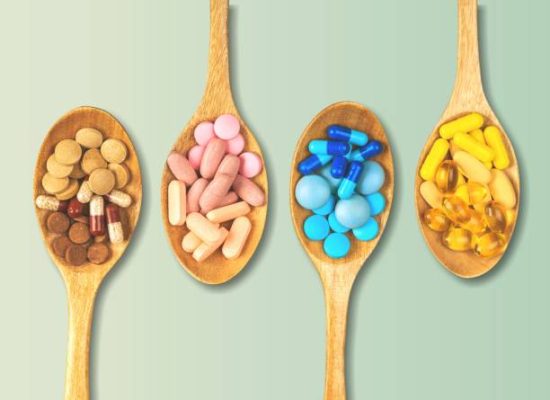Vitamins and Minerals
Top 7 Vitamins and Minerals Your Body Needs
Vitamins and minerals are micronutrients that the body must perform a spread of activities. These micronutrients, on the opposite hand, don’t seem to be created by our bodies and must be obtained from the food we eat.
Vitamins are chemical compounds that may be classed as fat-soluble or water-soluble. Vitamins that dissolve in fat (vitamin A, vitamin D, vitamin E, and vitamin K) tend to accumulate within the body. Water-soluble vitamins (vitamin C and B-complex vitamins including B, B12, and folate) must dissolve in water before being absorbed by the body and then can’t be stored. Any water-soluble vitamins that aren’t utilised by the body are mostly excreted within the urine. This article contains a number of life essentials vitamins that our bodies require.
Minerals are inorganic elements that are found in soil and water and are absorbed or ingested by plants and animals. While you’re probably aware of calcium, sodium, and potassium, there is a range of other minerals to think about, including trace elements that are required in minute amounts.
Dietary Reference Intakes (DRIs) for vitamins and minerals are developed by the National Academy of drugs. These are meant to supply a nutritional guide and a scientific foundation for formulating food standards for both of us. and Canada. The DRIs cover quite 40 nutritional substances and are tailored to age, gender, and life phases. The recommendations are supported by reports of nutritional insufficiency and toxicity.
Vitamin A
Vitamin A is important for the right functioning of your heart, lungs, liver, and other organs. it is also called beta-carotene and is useful to the reproductive, visual, and immunological systems.
Beef liver, salmon, broccoli, carrots, squash, green leafy vegetables, melons, apricots, mangoes, dairy products, and fortified cereals are all good sources of A.
Vitamin B
When it comes to life essentials vitamins, vitamin B is crucial.
B1 (thiamin), B2 (riboflavin), B3 (niacin), B5 (pantothenic acid), B6 (pyridoxine), B7 (biotin), B9 (folate), and B12 (cobalamin) are the eight essential B vitamins (cobalamin).
They’re all involved in the conversion of carbs, lipids, and proteins to energy. For cell development, growth, and performance, several B vitamins are required.
If you’re elderly, have had gastrointestinal surgery, have a gastrointestinal problem, or abuse alcohol, you will require more B vitamins. consistent with the American Pregnancy Association, women who are pregnant, breastfeeding, or about to become pregnant may require more B vitamins, particularly folate, which has been found to cut back birth abnormalities. B12 deficiency affects up to fifteen of the population. If you’ve got malignant anemia or are a vegan or vegetarian, you will require additional B12.
Meat, chicken, fish, organ meats, eggs, legumes, seeds, nuts, whole grains, fortified cereals, bread, and pasta are all good sources of B.
Vitamin C
Vitamin C, also called antioxidants, improves iron absorption from plant-based diets and supplements and stimulates the system. antioxidant protects our cells from atom damage because it’s an antioxidant. It also helps our bodies generate collagen, which assists wound healing.
Because it takes more water-soluble vitamins for your body to repair the cell damage caused by free radicals in cigarette smoke, smokers require 35 more mg of vitamin C per day than non-smokers.
Citrus fruits and juices, kiwi fruit, red and green peppers, strawberries, cantaloupe, broccoli, brussels sprouts, tomatoes, juice, and baked potatoes are all good sources of ascorbic acid. (cooking it in this manner, with the skin on, retains the folate, B6, and ascorbic acid.)
Calcium
Calcium makes up over 99 percent of the body’s calcium, which is important for structural support in bones and teeth. the remainder is found within the blood, muscles, and intracellular fluids, where it plays a crucial role during a kind of metabolic, neurological, and muscular processes. Calcium supplements are most ordinarily needed by postmenopausal women (who have an increased risk of osteoporosis) and persons who don’t consume dairy products (a key source of calcium).
Dairy products (including milk, cheese, and yogurt), fortified non-dairy milk (such as almond, soy, and rice milk), fortified fruit crush, sardines with bones, tofu (if made with calcium), kail, kale, and broccoli are all good sources of calcium.
Iron
Iron is required for the formation of red blood cells, particularly hemoglobin, a protein that binds oxygen and transports it via the blood from the lungs to the cells throughout the body. Because the iron in plant-based foods is a smaller amount accessible to the body than the iron found in animal products, vegetarians must ingest nearly twice the maximum amount of iron every day. Supplements may be required for pregnant women and people with iron deficiency anaemia.
Meat (particularly white meat and liver), shellfish, lentils, beans, tofu, cashews, and broccoli are all good sources of iron.
Magnesium
Magnesium is required for the performance of over 300 enzymes that control a spread of bodily functions, including muscle and neuron function, heart rhythms, and glucose control. Supplements could also be required for older elderly and diabetics.
Almonds, spinach, cashews, peanuts, beans, potatoes, brown rice, dairy products, oats, chicken, beef, and broccoli are all good sources of magnesium.
Zinc
Zinc may be a necessary mineral for appropriate growth and development during pregnancy and childhood, yet as for immunological function. Because the zinc found in plant-based diets is a smaller amount available to the body than that found in meat and fish, vegetarians may have supplements furthermore.
Red meat, poultry, seafood (particularly oysters, lobster, and clams), dairy products, whole grains, legumes, and nuts are all good sources of zinc.
To learn more about supplements, speak together with your pharmacist. In large amounts, some vitamins (such as vitamin E) are harmful, while others can interact poorly with other drugs or medical treatments.


